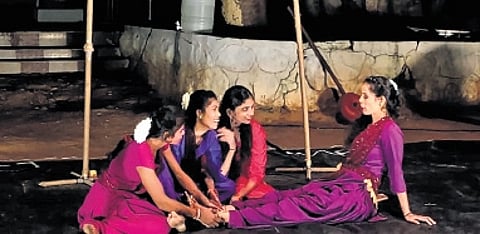

HYDERABAD: Lamakaan will soon witness a play that explores the childhood to adulthood journey of women who have faced sexual violence and oppression. Unlike many works that approach violence from a criminal perspective, ‘Nazar ke Saamne’, to be staged on September 6, examines it through the lens of body and societal oppression. “Beyond the obvious themes, the play delves into beauty, desires, and the sense of justice the women find in each other through the practice of theatre,” explains Angarika, one of the creators of the play.
What makes this play particularly intriguing is its non-verbal nature. It lacks a traditional script, with the narrative being devised from artworks created by the actors based on their conversations and personal experiences. Angarika, along with Anushi and Ekta from the Maraa Collective, embarked on a tour in 2018 to document experiences of violence against women from marginalised communities. They spoke to around 300 women of different ages and were profoundly moved by their stories. “We were disturbed by the feudalism, patriarchy, and caste system. We realised that the fight for justice is not confined to the courts but also exists within families and communities that often perpetuate isolation and violence,” Angarika shares.
Freeda Theatre, the group formed to give voice to these survivors, aims to highlight experiences without reducing the women to their traumas. The performance focuses on the body as a site of pain, violence, and silence. “If a woman has experienced violence, she is often not allowed to feel anything, to have desires or pleasures,” Angarika notes. The first few months of their work involved helping the actors feel and learn how to dissociate touch from violence.
The group’s performances aim to create a space for reflection. “The play evokes parts of ourselves we may have forgotten, suppressed, or may not even have recognised,” Angarika says. To address issues of caste and class, the group focuses on performing in rural areas.
Varsha Malviya, one of the actors, shares her transformative experience, saying, “Working with my body and breath for the first time allowed me to understand and experience many sensations. I had always seen my body from the outside, not from within; now, I feel like each part of my body is trying to communicate with me.”
She admits that being vulnerable on stage was initially challenging, often leaving her feeling heavy after performances. But she now feels empowered. When she gets tongue-tied on stage, she refocuses on her body and breath.
The performance is followed by a 30-minute discussion, providing women in rural areas an opportunity to converse and share their experiences. This play, beyond delivering a social message, aims to reconnect the audience with their own bodies.